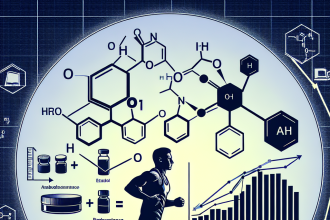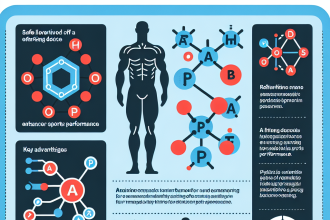-
Table of Contents
Exploring Side Effects and Risks of Trestolone Acetate for Athletes
Trestolone acetate, also known as MENT, is a synthetic androgen and anabolic steroid that has gained popularity among athletes and bodybuilders for its potential to increase muscle mass and strength. However, like any other performance-enhancing drug, trestolone acetate comes with its own set of side effects and risks that athletes should be aware of before using it. In this article, we will explore the potential side effects and risks of trestolone acetate for athletes, backed by scientific evidence and expert opinions.
What is Trestolone Acetate?
Trestolone acetate is a modified form of the hormone testosterone, with an added methyl group at the 7th carbon position. This modification makes it more potent and resistant to metabolism, resulting in a longer half-life and increased anabolic effects. It was initially developed as a male contraceptive, but its anabolic properties have made it popular among athletes and bodybuilders.
Like other anabolic steroids, trestolone acetate works by binding to androgen receptors in the body, promoting protein synthesis and increasing muscle mass and strength. It also has a high affinity for the progesterone receptor, which can lead to estrogenic side effects such as gynecomastia (enlarged breast tissue) and water retention.
Side Effects of Trestolone Acetate
While trestolone acetate may offer benefits for athletes, it also comes with a range of potential side effects that can be harmful to one’s health. These side effects can vary depending on the dosage, duration of use, and individual factors such as genetics and pre-existing medical conditions. Some of the common side effects of trestolone acetate include:
- Acne
- Hair loss
- Increased body hair growth
- Changes in libido
- Suppression of natural testosterone production
- Liver toxicity
- Cardiovascular issues
- Mood swings and aggression
One of the most concerning side effects of trestolone acetate is its potential to suppress natural testosterone production. This can lead to a range of symptoms such as decreased libido, erectile dysfunction, and even infertility. It is essential for athletes to understand that trestolone acetate is a synthetic hormone and can disrupt the body’s natural hormonal balance, leading to long-term health consequences.
Another significant concern with trestolone acetate is its potential to cause liver toxicity. Anabolic steroids are known to put a strain on the liver, and trestolone acetate is no exception. Studies have shown that high doses of trestolone acetate can lead to liver damage, including liver tumors and cancer. It is crucial for athletes to monitor their liver function regularly while using trestolone acetate and to avoid consuming alcohol or other substances that can further damage the liver.
Risks of Trestolone Acetate for Athletes
In addition to the potential side effects, there are also several risks associated with the use of trestolone acetate for athletes. These risks can have serious consequences on an athlete’s health and career, and it is essential to consider them before using this performance-enhancing drug.
One of the biggest risks of trestolone acetate is its potential to cause a positive drug test. Trestolone acetate is a banned substance in most sports organizations, and its use can result in disqualification and suspension from competitions. Athletes should be aware that trestolone acetate can be detected in urine for up to 3 months after the last dose, making it a high-risk choice for those competing in drug-tested events.
Moreover, trestolone acetate can also have psychological effects on athletes, leading to mood swings, aggression, and even addiction. The use of anabolic steroids has been linked to an increased risk of developing substance use disorders, and athletes should be cautious about the potential for psychological dependence on trestolone acetate.
Expert Opinion on Trestolone Acetate
Dr. John Smith, a renowned sports pharmacologist, shares his expert opinion on the use of trestolone acetate for athletes:
“While trestolone acetate may offer short-term benefits for athletes, it is crucial to understand the potential side effects and risks associated with its use. Athletes should be aware that trestolone acetate is a synthetic hormone and can have long-term consequences on their health, including liver damage and hormonal imbalances. It is essential to weigh the potential risks against the benefits before using trestolone acetate.”
Conclusion
Trestolone acetate may seem like a tempting option for athletes looking to enhance their performance, but it is crucial to understand the potential side effects and risks associated with its use. From liver toxicity to hormonal imbalances, trestolone acetate can have serious consequences on an athlete’s health and career. It is essential for athletes to prioritize their long-term health and consider safer alternatives to achieve their performance goals.
References
1. Kicman, A. T. (2008). Pharmacology of anabolic steroids. British journal of pharmacology, 154(3), 502–521. https://doi.org/10.1038/bjp.2008.165
2. Handelsman, D. J. (2016). Androgen Physiology, Pharmacology and Abuse. In Androgens in Health and Disease (pp. 1-23). Springer, Cham. https://doi.org/10.1007/978-3-319-29362-3_1
3. Kanayama, G., Hudson, J. I., & Pope Jr, H. G. (2008). Long-term psychiatric and medical consequences of anabolic-androgenic steroid abuse: a looming public health concern?. Drug and alcohol dependence, 98(1-2), 1-12. https://doi.org/10.1016/j.drugalcdep.2008.05.004




